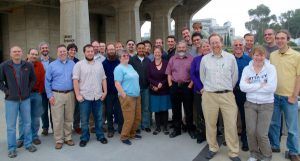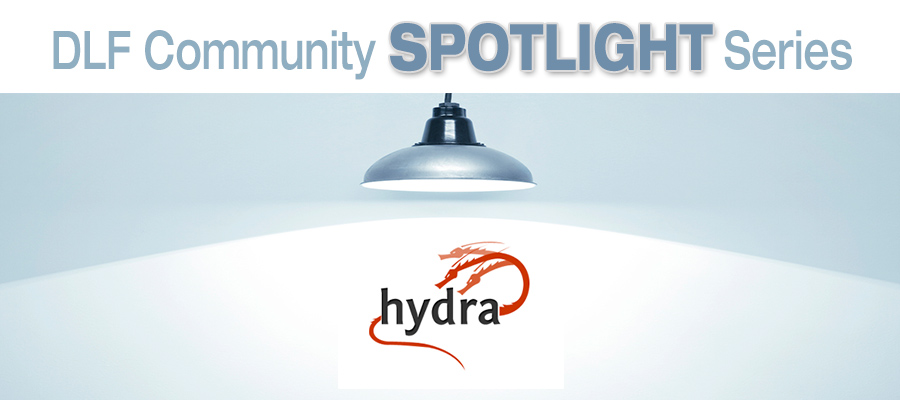This Community Spotlight was provided by Bess Sadler, Manager, Application Development, Stanford University Libraries.
One of the things I like about working on the Hydra Project is the way we explicitly think of ourselves as a community. Hydra is a repository solution, and a technical framework, and a free and open source software project, but most of all Hydra is a group of people who build digital libraries together. By developing shared approaches to digital library challenges, we’re not only building software; We’re also building best practices, support systems, advice networks, development partners, and friends.
When I set out to write a Community Spotlight article about Hydra, I started by asking our community what Hydra has meant to them. Here are some of the responses I got:
This one is from Mike Giarlo, Penn State’s Digital Library Architect. Penn State recently launched ScholarSphere, a Hydra-based repository service, to great acclaim.
I have to admit that I hadn’t really thought much about this until your message, though I have enthusiastically chatted with dozens of folks over the past two years about my and Penn State’s experiences with Hydra.
Professionally, Hydra has been tremendous for Penn State. In the course of little more than six months, my institution went from being invisible in the repository domain to approaching the leading edge, despite having little experience with any of the Hydra technologies. We were able to pull this off for a few reasons, and the big ones were the vibrancy and support of the community and the maturity of the tools. Prior to Hydra none of our code was publicly available, and that was a stark contrast to developing on GitHub and having developers in the community comment on our code, develop fixes, and write tests for ScholarSphere—all without being asked.
Personally, I’ve greatly enjoyed being part of the Hydra community. I remember attending CURATEcamp at code4lib 2011 in Bloomington—I was at a table talking about the ingest process, broadly, and the idea of curation microservices. My most vivid memory of this CURATEcamp, though, is seeing a group of Blacklight and Hydra community developers—even though I knew all the folks around that table represented different institutions, the way they worked together and got along spoke volumes to me about the camaraderie and shared mission of the Hydra community. I’m happy I get to work with the Bess Sadlers, Declan Flemings, Matt Zumwalts, Richard Greens, Michael Kleins, Adam Weads, etc. of the world, and we’ve continued to grow our community with bright, inquisitive, practical, and collegial people—just the sort of people I want to spend my time with. It’s extremely important to me that I love my job (and I do!) and being part of the Hydra community is a big part of that.
I also received a letter from Adam Wead, who is designing and building the digital library at The Rock and Roll Hall of Fame and Museum:
Hydra has been a tremendous boon to my professional career. I got involved early on when I was researching software for digital asset management. At the time, it was a great solution for us, but I had no idea it would be growing in popularity so fast. I’ve now had the privilege of becoming a partner with some very prominent institutions and colleagues with a lot of really, really smart people. I have presented at conferences about my work with with Hydra, and have recently been asked to help teach others how to use it. However, I didn’t start using Hydra to further my own career, I used it to accomplish what I needed to do for my job. To that end, Hydra has proven to be an integral part of our systems at the Rock and Roll Hall of Fame. In short, I couldn’t have done what I did without Hydra or the people who are a part of it.
Personally, Hydra also means a really excellent group of people who have helped shepherd my projects along the way. The men and women of the Hydra community are some of the best and brightest in the library technology world. Each of them brings their own experiences and knowledge to discussions that we have about the kinds of problems we collectively face. It’s a great feeling when you know, no matter how difficult a particular problem is for you and your particular institution, there’s a potential solution only an email or an irc conversation away.
And here’s one from Dan Coughlin, one of the developers at Penn State who helped to build ScholarSphere:
Coming from a central IT unit, when I got to “library IT land” I was overwhelmed by the complexity and depth of the problems the library is facing. It took a while for me to retrain my brain and not immediately think of a tar file when someone said “archive.” I started paying attention to the Code4Lib community, and was blown away by how *everyone* seemed to know so much more than I did. I never really found a voice in an online community before and it seemed like C4L had enough voices, and all of them had more experience and knowledge than I. Hydra was a smaller community, and focused on a specific problem in the world of library IT. I was able to have a better understanding what we, as a community, were focused on and that specificity allowed me to contribute back to the community more quickly. A large portion of my comfort to contribute was because I feel that I know a lot of the people in the community from our weekly calls, quarterly meetings, LibDevConX, etc., and it is a (pull requests) welcoming group.
Hydra Partner meetings have a great vibe with people from other institutions sitting down together to work on problems. I enjoy seeing the great work others are doing in this space as it inspires us to to put out better products. We have a lot going on in the repository development discussions with those from other top-notch development teams and institutions and it makes me feel like a part of something bigger, and I find that both rewarding and exciting.
There are some real super stars in the community and they all conduct themselves in an very professional and inclusive manner. The manner in which things are corrected is in line with creating a better product. There isn’t a sense of the best technical people needing to prove themselves. Generally speaking, people are continually encouraging other to contribute back.
For me, Hydra has been the satisfaction of witnessing the evolution of what digital libraries can be.
I got my first digital library job almost a decade ago, as a software developer. In those days, in order to build the systems we were being asked to build, I had to also try to play the role of repository architect, front end designer, systems analyst, metadata consultant, and forensic expert in legacy digital humanities projects. It was both exhilarating and daunting. Some days I reveled in the interesting puzzles I got to solve, and some days I sat at my desk and cried, overwhelmed by how much there was to learn and how many plates had to be kept spinning. I loved building new projects, but I was also painfully aware of how fragile and unmaintainable many of them were.
The answers I received to my recent Hydra mailing list question give me hope that these days a newly hired digital library developer might have things a little easier and make progress a little more quickly. In our community of practice I see a pace of development that would have been impossible even a few years ago, and I see us collectively solving problems we never could have tackled as individual institutions. I’m proud of what we’ve built, and I’m grateful for my place in the hydra community.


